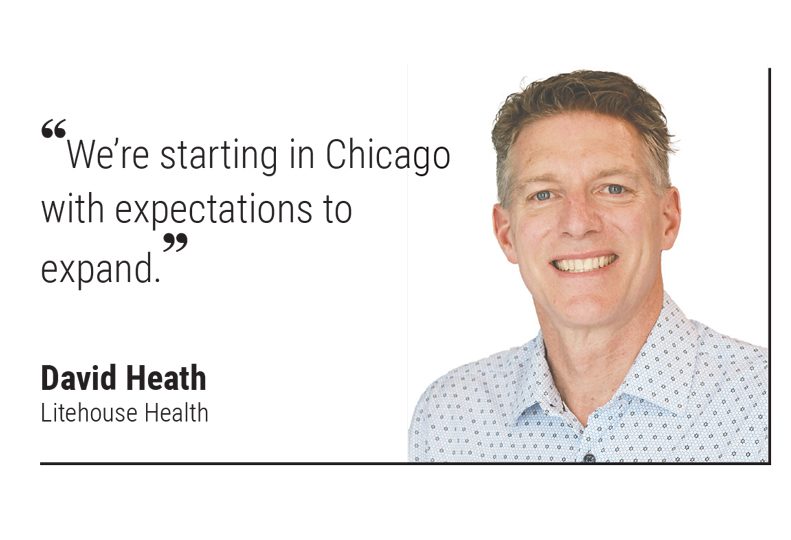
Litehouse Health inks deal with Advocate Health
Spokane-based startup's Beacon technology drawing interest as well

Spokane-based startup Litehouse Health Inc. has landed a contract with Advocate Health, one of the nation’s largest nonprofit health care systems.
“They have 69 hospitals in their network,” says David Heath, co-founder and CEO of Litehouse, which provides acute-care hospitals with local nurses on demand through its app. “We’re starting in Chicago with expectations to expand.”
As Litehouse continues to grow its on-demand nurse platform, another potential revenue stream—the company's Litehouse Beacon software-as-a-service offering—has garnered more interest than originally anticipated.
Litehouse, which was founded in 2023, now has over 150 nurses on its platform, some of whom began taking shifts at a handful of Chicago hospitals in January. Litehouse serves as the nurses' employer and enables its nurses to take available shifts when they want, creating more flexibility than they would have if they were employed by a health care system.
About 70 of the nurses are currently going through Advocate Health’s onboarding process to begin taking shifts, just as a conventional new hire would do.
Charlotte, North Carolina-based Advocate Health operates in six states—Alabama, Georgia, Illinois, North Carolina, South Carolina, and Wisconsin.
While this isn't Litehouse's first contract, Advocate Health is its first partner to really embrace the Spokane company's model, Heath says.
Litehouse Beacon, the company’s software-as-a-service offering, integrates with hospitals’ existing systems to optimize shift scheduling and to help hospitals manage their own staffs better.
“It saves a ton of time for the schedulers, makes life much easier, brings transparency to their staffing needs, and in the end, helps better utilize their labor force,” Heath says.
Litehouse is creating a pilot for the Beacon technology.
While the technology was a foundational piece of the company, Heath says he didn’t expect such a high level of interest.
“They’re actually more excited about this than the nurse marketplace,” he says.
Going forward, Heath says a primary goal is to grow at a manageable rate and to work toward profitability.
Litehouse is in talks about its nursing platform with multiple other health systems nationwide, including with “one of our two major health systems” in the Inland Northwest.
Heath declines to disclose the name of the health care system. MultiCare Health System and Providence Health & Services-Washington are the two largest health care systems with presences in the Spokane area.
“We need to walk before we run,” Heath says. “We’re in the process of doing that, but we’re off to a really good start.”
The overarching goal of Litehouse is to help its clients stabilize their workforces.
Exacerbated by the COVID-19 pandemic, nursing shortages have continued to plague the health care industry and are expected to do so for years to come.
A 2024 report from the U.S. Chamber of Commerce states that by 2030, it is expected that 42 out of the 50 U.S. states likely will experience shortages in nursing staff.
In many cases, including at MultiCare and Providence hospitals in recent years, there has been an increased reliance on travel nurses to address the labor shortfalls. Travel nurses are more costly, however.
Litehouse aims to provide health care systems with an alternative to travel nurses, by bringing local nurses off the sidelines, Heath explains.
“This reduces their use of travelers and keeps nurses working locally, and in some cases, gets them working again,” he says.
Some of the Litehouse nurses in Chicago had previously worked for Advocate Health.
“Some left for maternity reasons,” Heath says. “Others left for a varying degree of personal reasons and now can come back and work at Advocate on their own terms.”
Heath says many of the nurses with prior experience at Advocate Health had good working relationships with the health care system, but were unable to meet the rigid requirements that often come with traditional nursing jobs.
“Long term, if they choose to go back to Advocate instead of Litehouse, they can do so and there’s no fee as part of that transaction,” Heath says.
In addition to nurses who are using Litehouse to reenter the nursing workforce, there are also nurses using the platform to take on additional shifts on top of their jobs with other health care systems.
To avoid taking away nurses from its client, Litehouse doesn’t employ nurses currently employed by Advocate Health.
For the hospitals, using Litehouse nurses is cheaper than using travel nurses, Heath contends. It’s financially comparable to using their own nurses when benefits are included.
“It saves the hospital money, but it’s enough to get a nurse to come off the sidelines and to make it worth his or her while to come to work,” says Heath.
To generate revenue, Litehouse takes a portion of the bill rate that hospitals set for the on-demand nurses. The vast majority of the bill rate, however, goes to the nurses via W-2 wages.
While Litehouse operates at a national level, most of the company’s contracted service providers—legal, accounting, software support, and advertising—are based in Spokane, Heath says.





![Brad head shot[1] web](https://www.spokanejournal.com/ext/resources/2025/03/10/thumb/Brad-Head-Shot[1]_web.jpg?1741642753)